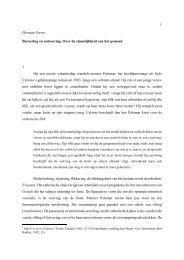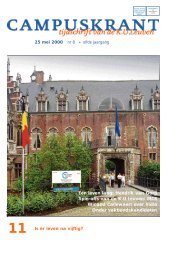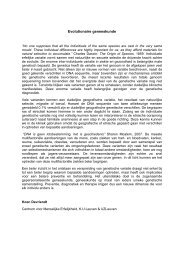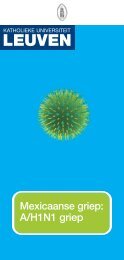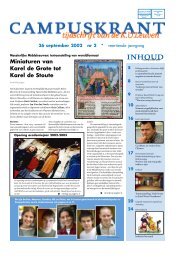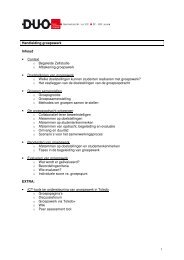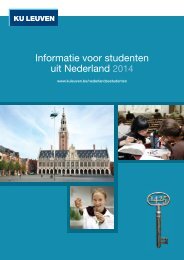EQUALITY GUIdE - KU Leuven
EQUALITY GUIdE - KU Leuven
EQUALITY GUIdE - KU Leuven
You also want an ePaper? Increase the reach of your titles
YUMPU automatically turns print PDFs into web optimized ePapers that Google loves.
Chapter 1 ! Personnel development and organisational culture 63<br />
other backgrounds, languages and disabilities. There is however a significant difference<br />
between the sexes, with female students scoring lower then male students and hence<br />
showing a more positive attitude towards diversity and equal opportunities (U =<br />
36775; p = 0.001). Refer to table 1.10 in the Appendices for more details.<br />
On the scale about attitudes towards projects and initiatives, the students (N =<br />
713) score an average of 17.3, which shows that the respondents consider the projects<br />
and initiatives to be important since it is closer to 9 (best score = respondents think all<br />
the projects are very important) than to 36 (worst score = respondents think all the<br />
projects are very unimportant). Again, more than half of the students answered at least<br />
once with ‘no opinion’. Significant statistical differences were found between faculties,<br />
with engineers according the least importance to the initiatives. A significant difference<br />
is also noted between different ethnic backgrounds, with students from a Belgian background<br />
scoring the highest (and hence according less importance) than all the other<br />
backgrounds. Hetero and LGB students differ significantly from each other on their<br />
attitudes to initiatives: LGB students consider it significantly more important. The same<br />
goes for women versus men: female students display a significantly more positive attitude<br />
than male students to initiatives and projects. There was no significant difference<br />
between students with and without disabilities on this matter, nor according to the<br />
languages spoken at home. Details about the differences between groups can be found<br />
in table 1.11 in the Appendices. When looking at the items separately, we notice that<br />
respondents attach the least importance to the LGB guide. On the other hand, the free<br />
language lessons for students are considered important to very important by 94.2% of<br />
the respondents. The item about the 1/3-2/3 gender distribution on boards and committees<br />
is considered significantly more important by female students than by male<br />
students. Furthermore, on the item about addressing different channels for getting<br />
more ethnic minorities into job vacancies, a significant difference occurred between<br />
students from different backgrounds. Students from a TMA background have the most<br />
positive attitude towards this item, especially compared to students from a Belgian<br />
background.<br />
The frequencies (in %) of knowledge and use of student services are summarized<br />
in the table below. The large amount of missing responses is marked in the last column.<br />
A future survey should emphasize the importance of answering all of the items,<br />
even if the respondent does not know the service or has never used it.<br />
The services most commonly known to students are the computer rooms and the ‘selfstudy’<br />
centres. The trust persons and the possibility to test themselves for a learning<br />
disorder are least known by the students. The facility students use the most are the<br />
computer rooms. As a matter of fact, this facility was considered the most important by<br />
the respondents since more than 84% considers this important to very important. The<br />
service students use the least is the child care facility (1%), followed by the trust persons<br />
(1.2%). The service to which the least importance is attached is the child care<br />
facility (20% of respondents). Over 27% of the respondents did not even answer the<br />
question about the importance. When we analyse the items separately, we find that<br />
female students consider Sjerp, the self study centre, the course counsellors, study



